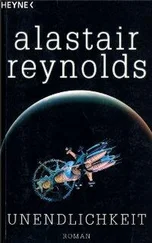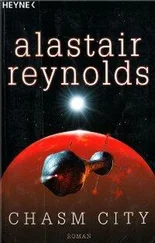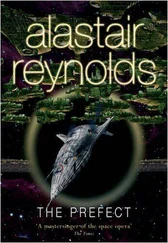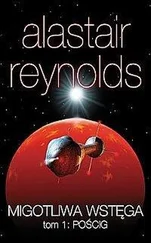* * *
The days continued passing — Crucible becoming first a starlike dot and then a mote of light so insignificant that Goma could not readily separate it from its star. Distance and then more distance — time opening up like a wide swallowing mouth. The ship functioned with an almost merciless reliability. Some part of Goma almost willed it to malfunction — hoping for some serious but not fatal glitch, sufficient to make them turn around.
But the ship did not oblige.
Goma, meanwhile, did her best not to disappoint Vasin. Reaching out was a step too far, but she avoided the Chancers when she was able and bit down on her worst impulses when she was forced to talk to them. Most of the time, it was not too difficult. She had learned a lot of self-control around elephants as well as people.
She continued to enjoy the solitude of the Knowledge Room, delighting in the endless, childlike pleasure of dipping a hand into the well and scooping out worlds. But soon even that simple pleasure was tested. Aiyana Loring and the other scientists began to show up with increasing frequency, using the well to explore speculative ideas about the Gliese 163 solar system. Goma and Ru were also expected to join in, offering their insights and opinions. Goma was rankled to begin with, feeling that she was no longer at liberty to organise her day as she wished. But it was hard to stay annoyed with the elegant, obliging Loring for very long. Goma was fascinated by the way ve moved, the sense that the slightest, most trivial gesture had been considered and choreographed. There was also something captivating about Loring’s androgynous beauty, even the deep, calm register of ver voice.
‘This is the central mystery, as far as I’m concerned,’ Loring was saying, kneeling at the well, reaching into it with one hand to scoop out the blue ball of Poseidon. ‘Our superterran waterworld. Maybe the origin of the signal? Not necessarily from the surface, but somewhere in orbit? If there aren’t moons around it, we’ll have an equally fine time explaining their absence.’
‘Why not the surface?’ Ru asked.
‘There won’t be one?’ Loring had a way of phrasing ver statements as questions, even when they were not. ‘Just a continuous layer of water, much deeper than any terrestrial ocean? A true waterworld?’
‘Sounds boring,’ Goma said.
‘Would be, if we didn’t already know that something’s going on there. No detailed imagery of the world itself yet — this sphere is conjecture, nothing more — but we know enough to be puzzled. There’s oxygen, to begin with — spectral lines in the atmosphere, green tints and chlorophyll signatures. So, life? Not necessarily multicellular, but enough to sustain an oxygen cycle?’
‘In the oceans?’ Ru asked.
‘Or maybe on top of them? Blooms, mats, entire floating land masses and ecologies?’
Goma delicately extracted the sphere from Loring’s hand. It still felt odd to know that there was nanotech between her fingers — feared, fabled nanotech. And yet it felt as innocent and harmless as clay.
‘Why not dry land?’ she asked.
‘Because there won’t be any. Poseidon’s too massive, with too much surface gravity. Continents, mountain ranges? They get flattened out, smothered by water. Push one up and it’ll be gone again before you can blink.’
‘By which you mean over tens of millions of years,’ Ru said.
Loring smiled. ‘Think like an exobiologist. A million years? That’s nothing. There and gone. Anyway, I don’t expect dry land. But it’ll be exciting to see what is there. Not the real mystery, though.’
‘No?’ Goma asked.
‘Question is why it hasn’t cooked itself to death. Runaway greenhouse effect — water vapour boiling off that sea, trapping heat in the atmosphere? Feedback cycle — more heat, more vaporisation?’
‘That obviously hasn’t happened,’ Ru said.
‘No. Hot but not too hot. Bearable for us, with tech. Maybe even limited exposure without. So: some thermoregulation process. Life by itself maybe not be sufficient to achieve that. Also, Poseidon ought to be tidally locked by now — keeping one face to Gliese 163. Hot one side, cold the other. Why isn’t it? What’s keeping it spinning? Need to get in closer, find out.’
‘Maybe it’s not even the world we’re interested in,’ Goma said, thinking only of the signal and its point of origin.
‘I am,’ Loring answered.
‘It’s just a planet,’ Goma said, ‘a rock and some gas and liquid, and — if we’re very lucky — maybe some scummy green organisms.’
‘Scummy green living organisms!’
‘The clue’s in the name,’ Goma said, taking a malicious pleasure in pedantry.
‘But life — doesn’t that fascinate you in and of itself?’
‘I’d have to say it doesn’t,’ Goma answered. ‘Life’s commonplace. We understand the basic processes — the originating principles of self-replication, the chemistry, the metabolic pathways. The same story plays out over and over again.’
‘Doesn’t make it any less marvellous.’
‘No, but it makes it less novel. Plant cells on Crucible aren’t exactly like plant cells on Earth, but neither are they unrecognisably different — there are only so many molecular transport mechanisms, only so many energy cycles, only so many ways of organising cells into larger structures. Biologists didn’t take long to solve the major mysteries of Crucible — much less time than it took to figure out how everything worked on Earth. They already had the tools, the ideas, and they knew the right questions to ask. Where’s the intellectual thrill in solving a puzzle twice?’
‘Elephants, though? Just another manifestation of those same principles?’
Goma glanced at Ru before answering. ‘There’s a difference. Elephants are intelligent. They have consciousness, self-awareness, a notion of self.’
‘It’s true,’ Ru agreed. ‘We’ve seen that they can acquire language, with some minor genetic enhancements. They can even speak, given the right prosthetic tools.’
‘But those elephants are gone now,’ Loring said. ‘They’ve lost the ability to speak, haven’t they? What did you call it — the cognitive decline?’
‘They’re gone on Crucible,’ Goma said, ‘but that doesn’t mean they’ve gone for good.’
‘I have read your work,’ Loring said. ‘The circumstances that produced the genetic breakthrough — the emergence of the Tantors? They’re not at all clear, are they? It happened in secret, across many generations? Hard to replicate, even if you had the tools?’
‘Maybe we don’t need to replicate it,’ Goma answered. ‘The gene stocks on Crucible were too small to sustain a viable population of Tantors. Genetic dilution — the averaging out of the Tantor traits across successive generations. But if we could locate a larger group of Tantors…’
‘Elsewhere in human space?’ Loring said.
Goma shrugged, equivocal, as if she had given the matter no great thought. ‘Perhaps.’
‘But no one has spoken of such a thing. If there were an independent Tantor population back in Earth space, would we not know, after all this time?’
‘Maybe they’re somewhere else.’
‘You’ll forgive me,’ Loring said, ‘but that does not sound like science to me.’
‘So what does it sound like?’ Ru asked.
‘Faith,’ Loring answered.
* * *
A day later, Goma was called to Vasin’s quarters again. She went there expecting another kindly lecture about the need for harmonious relations between the crew, but when she arrived it was immediately apparent that the purpose of this summons was very different. In addition to Gandhari Vasin, Mposi was also present, as was Aiyana Loring, Dr Nhamedjo, and Maslin Karayan. None of them looked at ease.
Читать дальше












